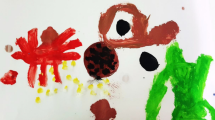Abstract
The use of a narrative approach in research and treatment enables a close-up view of the world of the client from his/her point of view. This approach opens a door to a differential understanding of states of distress and is particularly relevant with regard to distressed populations for whom verbal communication is the natural means of expression and much richer than any more formal means. The following article offers narrative analyses of stories of three women, mothers of multi-problem families, whose children's development is at risk. The stories were recorded during a research project which studied the responses of the participating women in an intervention program called Yachdav. The narrative analysis reveals the women's subjective perception of their situation of stress and of the methods of assistance available to them. The article examines the contribution of the narrative approach to the understanding of the point of view of the distressed segments of the population as a means of creating an alliance in assistance reception relations.
Similar content being viewed by others
REFERENCES
Borden, W. (1992). Narrative perspective in psychosocial intervention following adverse life events. Social Work, 37(20): 135–141.
Bouchard, M.A. and Guerette, L. (1991). Psychotherapy as a hermeneutical experience. Psychotherapy, 28(3): 385–394
Bruner, J. (1990). Acts of meaning. Cambridge: Harvard University Press.
Corradi, C (1991). Text, context and individual meaning: Rethinking life stories in a hermeneutical frame. Discourse and Society, 2(1): 105–118.
Crites, S (1986). Story time: Recollecting the past and projecting the future. In: Narrative Psychology: The storied nature of human conduct, T.R. Sarbin (ed.), N.Y.: Praeger: 152–173.
Gergen, K.J. and Gergen, M.M. (1986). Narrative form and the construction of psychological science. In: Narrative Psychology: The storied nature of human conduct, T.R. Sarbin (ed.), N.Y.: Praeger: 22–44.
Goodson-Lawes, J. (1994). Ethnicity and poverty as research variables: Family studies with Mexican and Vietnamese newcomers. In: Qualitative research in social work, E. Sherman and W.J. Reid (eds.). N.Y.: Columbia University Press: 21–31.
Hardy, B. (1986). Towards a poetic of fiction: An approach through narrative. Novel, 2: 5–14.
Hartman, A. (1994). Setting the theme: Many ways of knowing. In: Qualitative research in social work, E. Sherman and W.J. Reid (eds.). N.Y.: Columbia University Press: 459–463.
Howard, G.S. (1991). Cultural tales: A narrative approach to thinking, cross-cultural psychology and psychotherapy. American Psychologist, 46(3): 187–197.
Imre, R.W. (1994). Commentary: Epistemological disagreements and the search for understanding: In: Qualitative research in social work, E. Sherman and W.J. Reid (eds.). N.Y.: Columbia University Press: 487–492.
Kermode, F. (1981). Secrets and narrative sequence. In: On Narrative, W.J.T. Mitchell (ed.). Chicago: University of Chicago Press: 79–98.
Lacan, J. (1988). Seminar on “The Purloined Letter”. In: The Purloined Poe: Lacan, Derrida and Psychoanalytic Reading. J.P. Muller and W.J. Richardson (eds.). U.S.A.: The Johns Hopkins University Press.
Levi, Z. (1986). Hermeneutics. Tel-Aviv: Workers Press, Hakibbutz Ha'meuchad. (In Hebrew).
Mazzeo, A. (1978). Varieties of interpretation. London: University of Notre Dame Press.
McAdams, D.P. (1988). Power, intimacy and the life story: Personological inquiries into identity. N.Y. Guilford Press.
Mitchell, W.J.T. (1981). Forward. In: On Narrative, W.J.T. Mitchell (ed.). Chicago: University of Chicago Press: vii–x.
Novick, R. and Krumer-Nevo, M. (1993). Yachdav: From multi-generational poverty to nurturing and independent parenting. Research and evaluation report. Jerusalem: Bayit Lekhol Yeled-The Ministry of Labor and Social Affairs, The Hebrew University. (In Hebrew).
Omer, H. (1994). Critical interventions in psychotherapy: From impasse to turning point. N.Y.: W.W. Norton.
Peker, P. Kampmeir, M. and Novick, R. (1990). “Yachdav”-Mothers from multi-generational distress to nurturing and independent parenting. Society and Welfare. Vol 10(3): 211–221. (In Hebrew).
Pray, J.E. (1991). Respecting the uniqueness of the individual: Social work practice within a reflective model. Social Work, 36(1): 80–85.
Rimmon-Kenan, S. (1984). Narrative Fiction: Contemporary Poetics. London and New York: Methuen.
Rosenfeld, J.M. (1993). Partnership guidelines for the development of a practice with and for defeated populations. Society and Welfare, Vol. 13(3): 225–235. (In Hebrew).
Rosenfeld, J.M. Schon, D.A. and Sykes, I.J. (1995). Out from under: Lessons from projects for inaptly served children and families. Jerusalem: JDC-Brookdale Institute of Gerontology and Human Development, JDC-Israel, Children at risk area.
Rosenthal, G. (1987), The technique of the narrative interview. English translation from: Wenn alles in scherben fallt: Von leben und sinnwelt der kriegsgeneration. Opladen: Leske and Budiridi, chap. 5.2. s. 119–131.
Rosenthal, G. (1993). Reconstruction of life stories: Principles of selection in generating stories for narrative biographical interviews. In: The narrative study of lives, 1, R. Josselson and A. Lieblich (eds.). London: Sage Publication: 59–91.
Rotenberg, M. (1987). Re-biographing and deviance: Psychotherapeutic narrativism and the midrash. New York: Praeger.
Sarbin, T. R. (1986). The narrative as a root metaphor for psychology. In: Narrative Psychology: The storied nature of human conduct, T.R. Sarbin (ed.), N.Y.: Praeger: 3–21.
Sherman, E. and Reid, W.J. (eds.) (1994). Qualitative research in social work. N.Y.: Columbia University Press.
Steele, R.S. (1986). Deconstructing histories: Towards systematic criticism of psychological narratives. In: Narrative Psychology: The storied nature of human conduct, T.R. Sarbin (ed.), N.Y.: Praeger: 256–275.
Stevenson, O. (1992). Social work intervention to protect children: Aspects of research and practice. Child Abuse Review (1): 19–32.
White, H. (1981). The value of narrativity in the representation of reality. In: On narrative, W.J.T. Mitchell (ed.). Chicago: University of Chicago Press: 1–24.
Widdershoven, G.A.M. (1993). The story of life: Hermeneutic perspectives on the relationship between narrative and life history. In: The narrative study of lives, 1, R. Josselson and A. Lieblich (eds.). London: Sage Publication: 1–20.
Rights and permissions
About this article
Cite this article
Krumer-Nevo, M. What's Your Story? Listening to the Stories of Mothers from Multi-Problem Families. Clinical Social Work Journal 26, 177–194 (1998). https://doi.org/10.1023/A:1022871018520
Issue Date:
DOI: https://doi.org/10.1023/A:1022871018520




